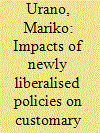| Srl | Item |
| 1 |
ID:
178382


|
|
|
|
|
| Summary/Abstract |
This paper focuses on the establishment of agricultural innovation platforms (AIPs) in the communal areas of Hwedza in Zimbabwe. Through the efforts of non-governmental organisations (NGOs), there have been initiatives to improve agricultural productivity in Africa and Zimbabwe in particular. One such intervention has been the AIPs that seek to bring together all stakeholders who can meaningfully contribute to the improvement of agriculture. Using largely qualitative approaches, data was collected through interviews from small scale farmers as well as different actors who were involved in the AIPs. The respondents in the study also included NGO workers, academic researchers, government workers, traditional leaders, agricultural financiers, extension workers and state-owned institutions. Using Norman Long’s interface analysis as the central theoretical framework, key findings showed that communal areas were active communities that had their own socio-economic network systems which govern how smallholder farmers operate. It also emerged that IPs are a result of a combination of the social and the formal/institutionalised structures that interacted in Hwedza. The paper concludes that IPs were established in Hwedza through a series of interactive processes among actors and these were not always smooth and successful.
|
|
|
|
|
|
|
|
|
|
|
|
|
|
|
|
| 2 |
ID:
132403


|
|
|
|
|
| Publication |
2014.
|
| Summary/Abstract |
Based on interviews and participant observation conducted in the province of East Kalimantan, Indonesia, from 2008 to 2012, this paper examines why the agrarian reforms have failed to secure the land rights of local farmers. Since the fall of the authoritarian government in 1998, Indonesia has seen limited, but growing government recognition of customary land rights of local farmers living in forest areas. I present a case study of two villages, in which the greater discretion on the part of the local community to negotiate with large-scale oil palm estates has led to the abuse of power by local elites, as well as territorial tensions between local communities. The finding questions the optimistic view that state recognition of customary land rights of communities would automatically lead to the security of landownership of local farmers, and its underlying image of harmonious local communities in which members share coherent interests. The agrarian reform that has centred on communities' rights of control over land and natural resources is problematic. When local communities do not possess capabilities for resolving conflicts in an equitable and transparent manner, third-party intervention is needed to assist communities to strengthen local land rights.
|
|
|
|
|
|
|
|
|
|
|
|
|
|
|
|